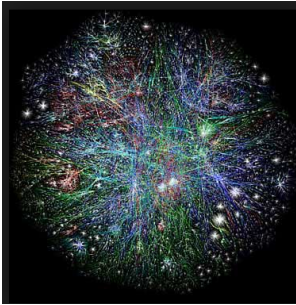
World Social Forum was in Montreal in 2016 under the proposal: Another world is needed. (It seemed a more urgent call than the claim that is was "possible". )
But how do we get there? Conway's review of the WsF and the Edges of Global Justice offers a good overview of a feminist response to pensiamente uno, a radical critique of the dominant epistemologies of the West. This feels particularly "needed" -- crucial and urgent -- since we must continue to reassemble the way progressive orthodoxies structure revolutionary presents and futures. We are ever reforming. I am particularly concerned here with a radical imagination. If our world is on its way to permanent disfigurement, and according to Bifo, semiocapitalism is blitzing our psyches ( just two of the "wages of sin"), what are our cognitive options?
One alternative: Boaventura de Sousa Santos' Epistemologies of the South, a dense decolonial brew. This argument is about the coloniality of power - the power to decide what should be studied, civilized, patented, harvested, and litigated. See below -- this is a good review of this work that includes de Landa, Dussel, Escobar, and others. All men, from a Latin American philosophical frame.
But where are we after we scale abyssal thinking? Yes to a "postcolonial or postimperial conception of rights, and they are: the right to knowledge; the right to bring historical capitalism to trial in a world tribunal; the right to a solidarity-oriented transformation of the right to property; the right to grant rights to entities incapable of bearing duties, namely nature and future generations..." (Barreto, below, p 26). But are rights redeemable?
Are there other ways to know "justice"?
We're still in the middle of a massive shift from positivism, scientism, one-world-ism, but how does a paradigm dissolve to reset the next one? If this is post- post-modern, post-structuralist. What are we pre ? We seem to be in the midst of parallel paradigms, or a mix of them interacting, like "scattered hegemonies." I pick up Thomas Kuhn's Structure of Scientific Revolutions. It's like Mr Toad's wild ride (a mix of Wind in the Willows and the ride at Disneyland.)
I keep asking the same questions: do all these new post-Western re-"orient"-tations shift the ways we act and be in the world? Frame our problems? Who is included in the solutions? What happens to the way we live if our justice is hyper-dimensional and space/time is heterogeneous, if it circles in on itself?
But how do we get there? Conway's review of the WsF and the Edges of Global Justice offers a good overview of a feminist response to pensiamente uno, a radical critique of the dominant epistemologies of the West. This feels particularly "needed" -- crucial and urgent -- since we must continue to reassemble the way progressive orthodoxies structure revolutionary presents and futures. We are ever reforming. I am particularly concerned here with a radical imagination. If our world is on its way to permanent disfigurement, and according to Bifo, semiocapitalism is blitzing our psyches ( just two of the "wages of sin"), what are our cognitive options?
One alternative: Boaventura de Sousa Santos' Epistemologies of the South, a dense decolonial brew. This argument is about the coloniality of power - the power to decide what should be studied, civilized, patented, harvested, and litigated. See below -- this is a good review of this work that includes de Landa, Dussel, Escobar, and others. All men, from a Latin American philosophical frame.
But where are we after we scale abyssal thinking? Yes to a "postcolonial or postimperial conception of rights, and they are: the right to knowledge; the right to bring historical capitalism to trial in a world tribunal; the right to a solidarity-oriented transformation of the right to property; the right to grant rights to entities incapable of bearing duties, namely nature and future generations..." (Barreto, below, p 26). But are rights redeemable?
Are there other ways to know "justice"?
We're still in the middle of a massive shift from positivism, scientism, one-world-ism, but how does a paradigm dissolve to reset the next one? If this is post- post-modern, post-structuralist. What are we pre ? We seem to be in the midst of parallel paradigms, or a mix of them interacting, like "scattered hegemonies." I pick up Thomas Kuhn's Structure of Scientific Revolutions. It's like Mr Toad's wild ride (a mix of Wind in the Willows and the ride at Disneyland.)
I keep asking the same questions: do all these new post-Western re-"orient"-tations shift the ways we act and be in the world? Frame our problems? Who is included in the solutions? What happens to the way we live if our justice is hyper-dimensional and space/time is heterogeneous, if it circles in on itself?

 RSS Feed
RSS Feed
